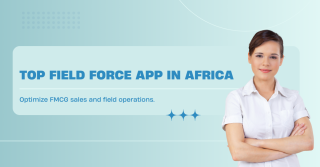The Role of GPS Tracking in Improving Customer Service for Field Sales
_1730026255.png)
In the fast-paced world of field sales, customer service is paramount. Sales representatives are often on the move, juggling multiple appointments and striving to meet customer needs efficiently. One technology that has emerged as a game-changer in this arena is GPS tracking. By leveraging GPS data, businesses can significantly enhance their service delivery, streamline operations, and ultimately improve customer satisfaction.
Accurate Arrival Estimates
One of the most immediate benefits of GPS tracking is the ability to provide customers with accurate estimated times of arrival (ETAs). Sales reps can monitor real-time traffic conditions and adjust their schedules accordingly. This transparency not only reduces customer frustration from long wait times but also fosters trust and reliability in the relationship. When customers know exactly when to expect their sales rep, it enhances their overall experience.
Efficient Route Optimization
GPS technology enables sales representatives to plan their routes more effectively. By analyzing traffic patterns and road conditions, reps can avoid congestion and select the fastest routes to their appointments. This optimization allows them to visit more clients in a day, maximizing productivity and ensuring that they can respond quickly to urgent customer needs. The result is a more efficient use of time and resources, leading to increased sales opportunities.
Enhanced Accountability
With GPS tracking, managers gain real-time visibility into their sales teams' activities. This capability allows for better oversight of daily schedules and ensures that reps are adhering to their planned itineraries. By tracking location data, managers can identify patterns in performance and address any issues that may arise, such as missed appointments or excessive travel time. This accountability not only helps in managing performance but also supports coaching efforts for continuous improvement.
Streamlined Administrative Processes
GPS tracking can automate many administrative tasks associated with field sales, such as mileage tracking and expense reporting. By automatically logging travel distances and times, sales reps can easily report their expenses without the hassle of manual entry. This automation saves time and reduces errors, allowing reps to focus more on selling rather than paperwork.
Improved Safety for Reps
Safety is a critical concern for field sales representatives who often work alone or in unfamiliar areas. GPS tracking enhances safety by providing real-time location data that can be accessed by managers in case of emergencies. If a rep encounters an issue or feels unsafe, they can quickly share their location with their team for assistance. This added layer of security not only protects employees but also promotes a culture of care within the organization.
Data-Driven Insights for Strategic Decisions
The data collected through GPS tracking can provide valuable insights into customer behavior and territory management. By analyzing visit patterns, companies can identify trends that inform strategic decisions about resource allocation and territory adjustments. For example, if certain areas show higher demand or require more frequent visits, organizations can reassign territories or adjust schedules accordingly.
Conclusion
Incorporating GPS tracking into field sales operations is not just about technology; it’s about enhancing customer service and driving business success. By providing accurate ETAs, optimizing routes, improving accountability, streamlining administrative tasks, ensuring safety, and leveraging data-driven insights, businesses can create a more efficient and responsive sales force. As organizations continue to embrace this technology, they will likely see significant improvements in both employee performance and customer satisfaction—key components for thriving in today’s competitive market.
FAQs
Q: How does GPS tracking enhance customer service?
A: GPS tracking improves customer service by providing accurate ETAs, optimizing travel routes for efficiency, and enabling better communication between sales reps and clients.
Q: Are there privacy concerns with GPS tracking?
A: While privacy concerns exist, most GPS systems are designed to track work-related activities during business hours rather than personal movements outside of work.
Q: What are the financial implications of implementing GPS tracking?
A: Implementing GPS tracking can lead to cost savings through reduced fuel consumption, lower insurance premiums, and decreased administrative burdens associated with mileage reporting.
Q: Can GPS data help optimize sales territories?
A: Yes, analyzing GPS data allows businesses to identify underserved areas and adjust territories accordingly to ensure balanced coverage and resource allocation.
Q: What tools are available for GPS tracking in field sales?
A: Popular tools include Salesforce Maps, Badger Maps, Spotio, and GeoOp, each offering unique features tailored for field sales management.









